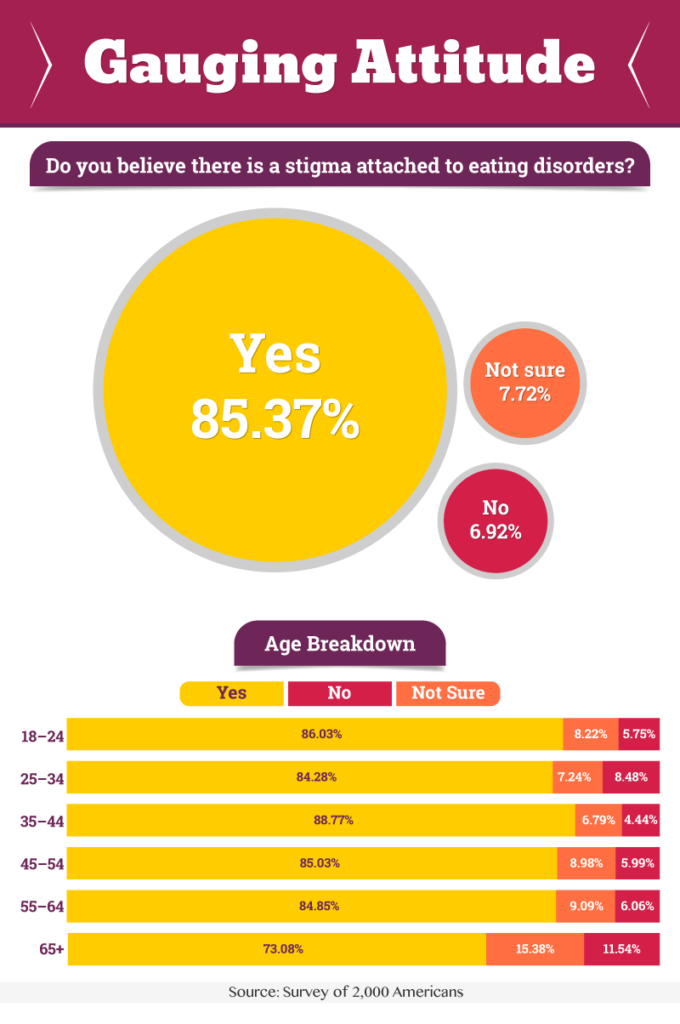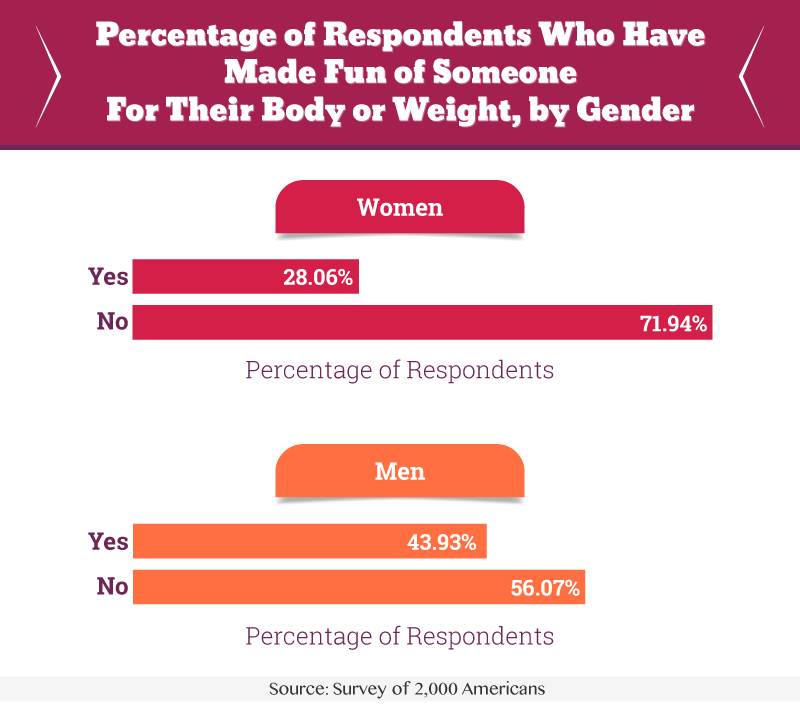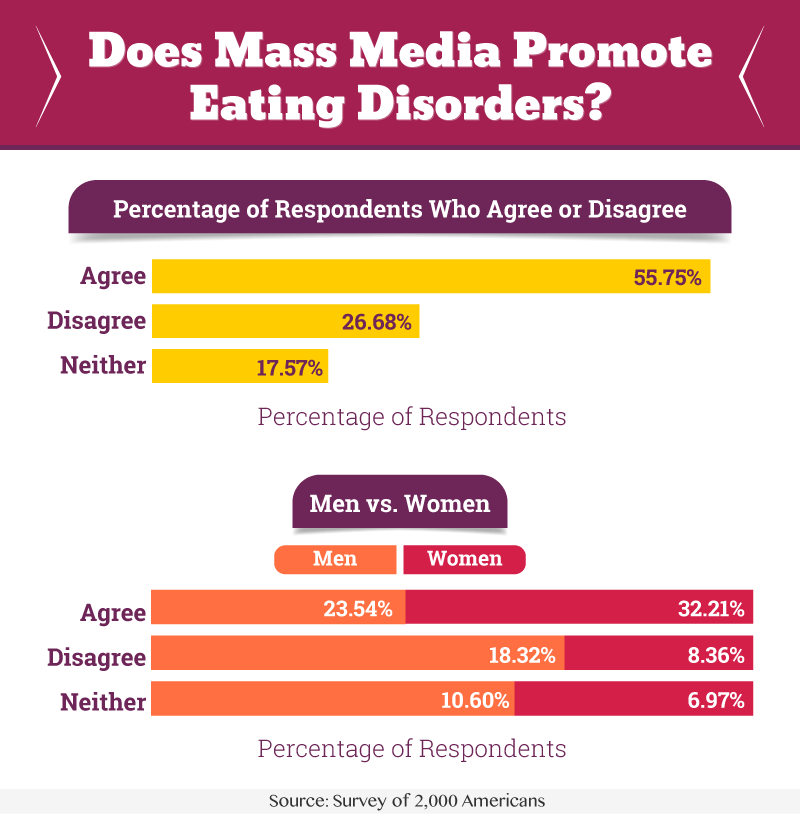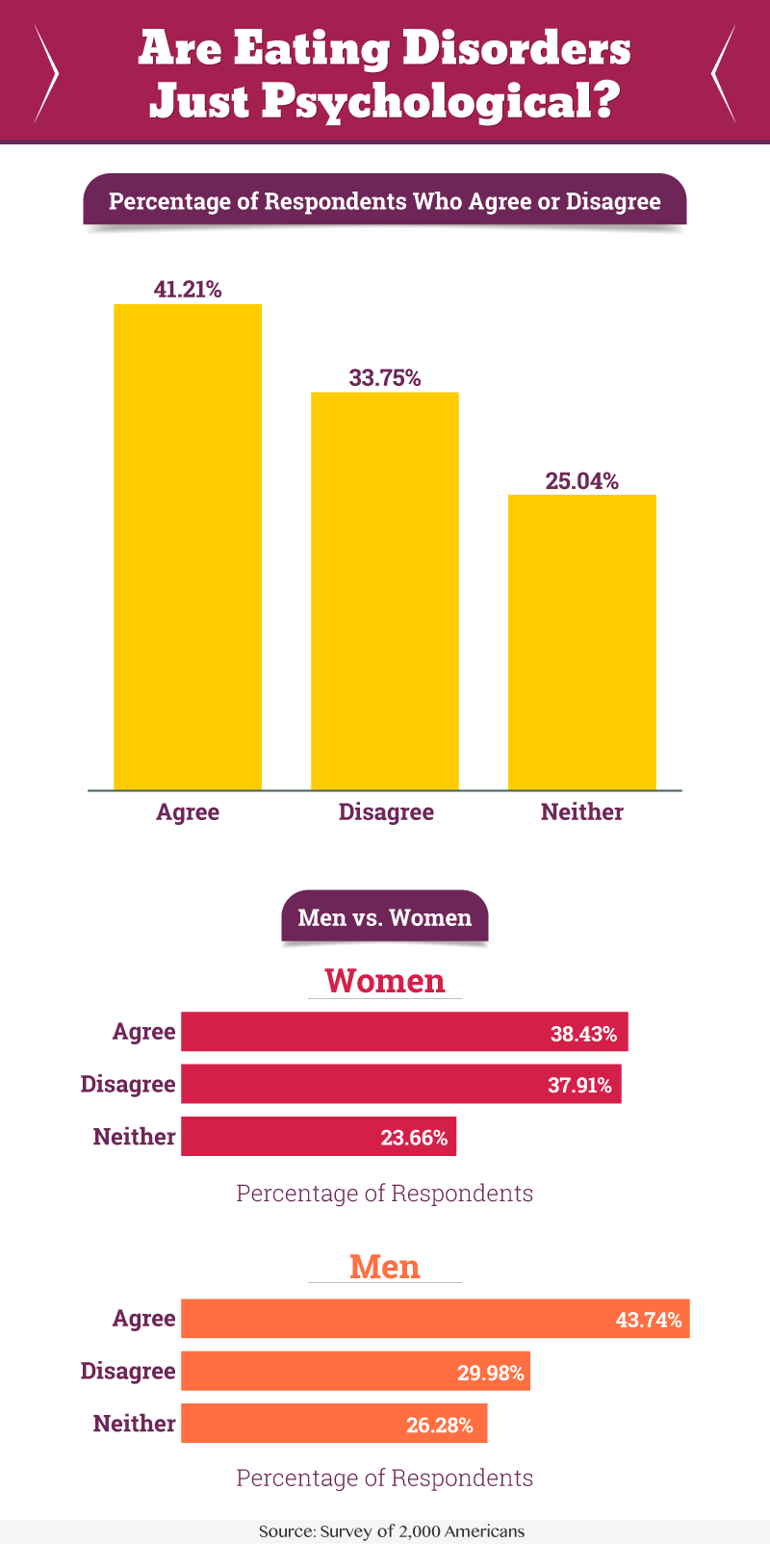Two out of every five people in the United States have either known someone with an eating disorder or suffered from one personally.
Despite the prevalence of eating disorders, the stigma and misunderstandings of how these conditions are formed and how they can be treated persists. We surveyed 2,000 people to understand the public’s attitudes and beliefs about eating disorders.
Understanding the Facts

The stigma attached to eating disorders often deters individuals from receiving the treatment they need. Our survey responses confirm that the fear of being stigmatized for an eating disorder is a very real concern. Of the 2,000 people we surveyed, over 85 percent admitted they believed there was a stigma attached to conditions like bulimia and anorexia. Those under the age of 65 were more inclined to acknowledge the stigma, particularly between the ages of 35 and 44. Beyond individual perceptions, eating disorders are even stigmatized by major health insurance companies, which can sometimes act as a barrier for treatment.
Stigma surrounding eating disorders may be linked to misunderstandings and an idea that eating disorders are a “choice.” Research today shows that disorders like anorexia and bulimia can be linked to predisposed genetic influences. While mental factors, like stress, can play a significant role in triggering these conditions, they are not the only reason they occur. Unfortunately, the idea that eating disorders are a “choice,” or not serious enough diseases to warrant significant help, is hard to correct, but continued public education can help.
No Laughing Matter

Our survey responses indicate that despite augmented attention surrounding bullying, many people may not recognize the effects of their words and may downplay the impact of bullying. Indeed, research shows that bullying can cause significant mental stress, PTSD-like symptoms, and even suicide. Research has also shown that bullying can lead to eating disorders like bulimia and anorexia, particularly in adolescents. Until society fully recognizes the harmful effects of their words and the resulting mental conditions, the stigma surrounding eating disorders may continue to persist.
Our survey responses indicate that men especially may be unaware of the impact of their harmful words — nearly half of our male respondents admitted that they bullied someone for their weight. Men may be more likely to tease their male peers about weight without realizing how harmful this bullying can be — Eating disorders impact millions of men in the United States. The effects of eating disorders in men are sometimes downplayed by causal terms like “manorexia,” signaling that eating disorders among men are not recognized for their status as true mental health conditions that often require medical intervention.
Body Image in Media

The effects of unrealistic body images as celebrated by mass media outlets such as magazines and movies, have been well documented, encouraging debate and discussion around the issue. In France, laws are even being passed to impose stricter guidelines on underweight models to avoid promoting unhealthy body images as desirable.
Social media has recently become a major outlet for enforcing new body image standards. Common terms like “thigh gap,” which glamorizes having thighs so thin that they don’t touch, have created new pressures on women to conform to sometimes unhealthy and unrealistic physiques. While parents may be tuned in to what their children see on TV, it can be harder to monitor the trends on social media, like Instagram and Facebook. Unfortunately, research has shown that the more time teen girls spend using sites like Facebook, likely they are to develop negative body images and eating disorders.
Over half of the people we polled acknowledged they believe that mass media promotes eating disorders. Of the nearly 56 percent who told us they agreed, over 32 percent were women. Men were less likely to agree, signaling that there is still a lack of awareness or acceptance surrounding the effects of mass media on body perceptions.
This lack of awareness about eating disorders continues to drive their stigma, severity, and complexity. Promoting these negative body image standards can have an impact on the psyche of men and women (particularly teenagers); ignoring these idealized images makes it more difficult for those who feel pressured to achieve an unrealistic body composition to recognize the truly dangerous health ramifications of these eating disorders. It can also delay their attempts to receive help because they see these body images celebrated through mass media.

The (Mis)perception of Eating Disorders
Despite research that has linked eating disorders to genetic predispositions, when we asked our survey respondents if they believed eating disorders were purely psychological, 41.2 percent told us yes and a little over 25 percent told us they were unsure. These responses suggest that mainstream knowledge on the causes and impacts of eating disorders is lacking — these misunderstandings of eating disorders may be contributing to perceptions that eating disorders are a lifestyle choice rather than a serious physical and mental illness.
Studies suggest that anorexia may have a heritability of 58 percent. While it’s difficult to rule out the impact a shared environment may have in causing these eating disorders to develop, the heritability studies deliver a clearer understanding that eating disorders are not always a choice and may be influenced by genetics or one’s environment.
Our resources can help connect individuals with treatment they need to recover from eating disorders. We have treatment advisors available by phone, and our website can help you find the best local care centers in your area.
Conclusion
Eating disorders are not a choice. Research has shown that they are mental and physical illnesses that can have tremendous effects on the lives of those who suffer from them. Unfortunately, people who suffer from eating disorders usually delay seeking treatment for about eight years. Reducing the stigma around these conditions can help eliminate the misperceptions that eating disorders are an indulgence or a sign of weakness and may also encourage those who suffer to seek help. Increasing public understanding of how eating disorders manifest from genetic, psychological and societal inputs is a step in the right direction.
Conditions like bulimia and anorexia can be fatal. If you or someone you know is suffering from an eating disorder, we are here to help. We provide access to thousands of resources across the country that can get you the help you need today.
Methodology
We surveyed 2,000 people to find out about their attitudes on eating disorders.